The Principle is No Change:
“One should accept the instructions of the Supreme Personality of Godhead by bowing down at the lotus feet of the Lord. This means that anything spoken by the Personality of Godhead should be taken as it is, with great care and attention and with great respect. It is not our business to amend the words of the Supreme Personality of Godhead or make additions or alterations, as it has become a custom for many so-called scholars and swamis who comment on the words of Bhagavad-gita. Here the practical example of how to accept the instruction of the Supreme Personality of Godhead is shown by Prthu Maharaja. This is the way to receive knowledge through the parampara system.” (SB 4.20.17 P Lord Visnu’ s Appearance in the Sacrificial Arena of Maharaja Prthu)
Regarding your editing, I would very much like it. I am sending my lecture copies to you. I think my other copies are lying on the left side of my seat in a cardboard box which please find out. Please be careful not to change the ideas. (Letter to Kirtananda, Feb 10, 1967)
“Brahmananda & others cannot change the style. They want to see if there is any grammatical discrepancy.“( Letter to Satsvarupa, Jan 22, 1968)
I have dictated the missing purports from Chapter IX and they are set enclosed herewith. So far changing the working of verse or purport of 12:12 discussed before, it may remain as it is. (Letter to Jayadvaita Mar 17, 1971) [This order from Srila Prabhupada was ignored and the purport was changed]
I am very glad to learn that you are translating the Bhagavad-gita As It Is into Portuguese. Be careful not to change anything but present it exactly as it is. This is how we receive Bhagavad-gita through the disciplic succession as stated in the Fourth Chapter. By this translating work you will learn our philosophy very nicely. It is very important to broadcast Krishna consciousness all over the world. This is the great need of modern civilization. (Letter to Frederico, Oct 24, 1974)
No, the printing of the Gitar-gan cover this fashion is not at all approved by me. You have done most nonsensically. Why change the cover? When people look to see the Bhagavad-gita they expect to see Krishna and Arjuna, not the picture of Krishna with cow. You have done a great mistake by changing the front picture and it will hamper the sale. In future you don’t do any changes without asking me first.
Simply because there is no stock of books, we can do anything whimsically??? Is this logic? Gita is not spoken in Vrindaban, it is spoken on the battlefield of Kuruksetra, but this is Vrindaban picture. That chariot driven by 4 horses, that is the real Kuruksetra picture. It is not that because there is no stock we can do whimsically as we like and lose the idea, that is rasa-bhasa. Because there is no bread, you take stone to eat? There is no stock of bread so you will take stone??? The front picture is most important thing and you have changed it. It must remain standard, and not change. Also, the lettering is not nice on the cover. You could have taken a color picture of Krishna and Arjuna and used it black and white (one color) on the front cover. Just as you did with the inside back cover of the Bhagavat darsana, the original picture of Sri Caitanya Mahaprabhu was in color but you have printed it in black and white. You could have done this on the front cover with Krishna and Arjuna on the Battlefield of Kuruksetra, but the cover must not be changed. (Letter: Bhargava, May 29, 1976)
You may title this book, Teachings of Lord Kapila, but it must be subtitled, “The Son of Devahuti”. That will remain, do not try to change it. The Americans may like it or not like it, but we must make the distinction between devahuti putra kapila, and the atheistic Kapila. Do not try to change anything without my permission. (Letter to Radhavallabha, Aug 26, 1976)
Titling of the Ninth Canto as Liberation is good, and the Tenth Canto should be called “The Summum Bonum”. As far as the 11th and 12th Cantos are concerned they shall be named when they are presented. The title which you have given to the Eighth Canto was a little hard to understand at first but if it refers to pralaya, then it is alright. You must consult with me on such matters. Do not manufacture anything. (Letter to Radhavallabha, Oct 7, 1976)
Please accept my blessings. With reference to your letter to Harikesa dated 21st inst., regarding the purport, 2nd paragraph to Bhagavatam 2.2.38, it is clear. Do not try to change anything. (Letter to Gopiparanadhana, Sep 28, 1976)
Some Corrections are OK:
Regarding the corrections you have sent, this kind of changes is admissable. There is no harm. (Letter: Radhavallabha, Oct 21, 1975)
The review from “Choice” is very remarkable considering the importance of the journal, and I thank you very much for securing it. You have written: “We are all eager for the day when your books are recognized as the greatest masterpieces of all. We are all eager for the day when your books are the most demanded works in the library. We are sure that day is not far away.” Yes, Krsna will fulfill your desire. Actually it is so. But because they are fools and rascals it will take some time. Regarding the error which the critic has noted about the location of Tirupati, I did not say so. It should be corrected. (Letter to Ranadhira, Apr 18, 1977)
There Should Not be Very Much Editing:
There is a verse in Srimad-Bhagavatam that a book or poetry in which the Holy Name of Krishna is depicted, such language is revolutionary in the matter of purifying the material atmosphere. Even though such literature is presented in broken language or grammatical inconsistency or rhetorical irregularity, still, those who are saintly persons adore such literature. They hear such literature, and chant it and adore it, simply because the Supreme Lord is being glorified in this literature. In other words, we are not meant for presenting any literary masterpieces, but we have to inform people that there is a fire of maya which is burning the very vitality of all living entities, and they should guard against the indefatigable onslaught of material existence. That should be our motto. (Letter to: Krsna dasa – Los Angeles 13 Feb, 1969)
I also do not like too much editorial work. This too much editorial work on Geetopanishad has created some misunderstanding between the members of the editorial staff. Anyway, in the future one man should edit it, and that will be sufficient for our printing. And I do not want that Teachings of Lord Chaitanya should be edited again and typed again and time wasted in that way. I have also informed Rayrama of this, and you can also inform him like this. The book should be printed immediately, without any waste of time. That is my desire. (Letter to Satsvarupa, Dec 23, 1967)
I have sent a few tapes to Bhagavan das. He sends to you his edited copies and they may be made final. I want two editings only, just to see if there is any grammatical or spelling mistake. Your present program of two editions first by yourself and then by Jayadvaita is a nice arrangement. Jayadvaita has good knowledge. (Letter to Satsvarupa, Feb 15, 1970)
Yes, there is no need for corrections for the first and second Cantos. Whatever is there is alright. Once Pradyumna comes to join me here from India, then there will be no need for Nitai das or Jagannatha das to edit the Srimad-Bhagavatam. (Letter to Radhavallabha, May 4, 1976)
English and Sanskrit in the Books Must Be Correct:
Prabhupada: Those who have got books, there should be one correction. It is written “how.” It should be “now,” n-o-w, not “how.” (Srimd-Bhagavatam Lecture, Oct 19, 1974)
I have just received the blueprint copy of KRSNA, the Reservoir of Pleasure and I have begun to read it through. But I notice that there are some points you should correct before the final printing. I have already noted you the injunction that you should change the pretipadika artha to first case ending instead. Sannyasin should be printed Sannyasi, etc. So please correct these.
Another point is that there are some errors in the English also. On page 2 it should read “. . . decided to kill his sister, Devaki.” but it has become sisters, plural. Then, what does it mean? “The Lord’s compromise was that He had Vasudeva propose . . .” This does not seem to be very clear or at least it is very awkward expression. So please see that the editors make a very careful final proofreading before printing the final copies. (Letter to Pradyumna, Apr 28, 1970)
Regarding publishing the Life from Life in English it should be grammatically correct because it is written book. Yes, it will be very good if you publish a book of lectures. (Letter to Hamsaduta, Nov 14, 1974)
Concerning the Bhagavat darsana cover, this Hindi on the back is not good. Who is translating this? Also, the address on the back of our Vrindaban Temple is not correctly spelled. It has been spelled Chattakara Road; But it should be Chattikara Road. Who is proof-reading? (Letter: Bhargava, May 29, 1976)
Hayagriva Did Not Change the Meaning of the Philosophy:
I don’t think that Hayagriva is at fault. He has not changed the meaning or the philosophy in any way. But if you like to use the original manuscript, then if it is possible, you can use it. (Letter to Hamsaduta, Jun 8, 1975)
BBT Editors Were Making Unapproved Changes:
I will have to see personally what are the mistakes in the synonyms and also how you intend to correct them. I was not satisfied with the corrections that were made before. I saw some changes which I did no approve. Nitai may correct whatever mistakes are there, but the corrected material must be sent to me for final approval. So reprinting the volumes will have to wait until the mistakes are corrected and approved by me. In the meantime you can supply the standing orders whatever new volumes are published. (Letter to Radhavallabha, Jan 5, 1976)
Prabhupada: The nonsense, they are… They are correcting my trans… Rascal. Who has done this? Munayah is addressing all these munis.
Tamala Krsna: It’s addressing the munis?
Prabhupada: Yes.
Tamala Krsna: Sadhus, great sages.
Prabhupada: Yes. Sadhu means they are very pure. What can be done if it goes there and these rascals becomes Sanskrit scholar and do everything nonsense? One Sanskrit scholar strayed, that rascal… He take… What is his…? Saci-suta? Saci-sandana?
Tamala Krsna: Jaya-sacinandana?
Prabhupada: And they are maintaining them. Different meaning.
Tamala Krsna: “Bhavadbhih – by all of you; loka – the world; mangalam – welfare; yat – because; krtah – made; krsna – the Personality of Godhead; samprasnah – relevant question; yena – by which; atma – self; suprasidati – completely pleased.” Translation: “O sages…”
Prabhupada: Now here is “O sages,” and the word meaning is “of the munis.” Just see. Such a rascal Sanskrit scholar. Here it is addressed, sambodhana, and they touch it — “munayah – of the munis.” It is very risky to give to them for editorial direction. Little learning is dangerous. However proper Sanskrit scholar, little learning, dangerous. Immediately they become very big scholars, high salaried, and write all nonsense. Who they are? (pause) Then?
Tamala Krsna: “O sages, I have been…”
Prabhupada: No, they cannot be reliable. They can do more harm. Just see here the fun(?).
(Conversation, “Rascal Editors” — June 22, 1977, Vrndavana)
Books Can Not Be “Simplified”:
Our literature is not sentimental stories. It is meant to be understood by the intelligent class of men. Children and those with child-like mentalities will do better to chant “Hare Krishna” and take prasadam. We cannot water down the philosophy to make it more palatable. Our books must remain as they are. Do not waste your time anymore with such attempts. We are not going to publish it. Whatever books we have got, let them try to understand, and if they cannot then let them chant “Hare Krishna” and take prasadam. (Letter to Lilavati, Mar 31, 1977)
Even if there are Some Discrepancies, They Are Accepted:
Transcendental literature that strictly follows the Vedic principles and the conclusion of the Puranas and pancaratrika-vidhi can be written only by a pure devotee. It is not possible for a common man to write books on bhakti, for his writings will not be effective. He may be a very great scholar and may be expert in presenting literature in flowery language, but this is not at all helpful in understanding transcendental literature.
Even if transcendental literature is written in faulty language, it is acceptable if it is written by a devotee, whereas so-called transcendental literature written by a mundane scholar, even if it is a very highly polished literary presentation, cannot be accepted. The secret in a devotee’s writing is that when he writes about the pastimes of the Lord, the Lord helps him; he does not write alone.
As stated in the Bhagavad-gita (10.10), dadami buddhi-yogam tam yena mam upayanti te. Since a devotee writes in service to the Lord, the Lord from within gives him so much intelligence that he sits down near the Lord and goes on writing books. (Caitanya-caritamrta Adi-Lila 8.39)
So unless one is self-realized, there is practically no use writing about Krsna. This transcendental writing does not depend on material education. It depends on the spiritual realization. You’ll find, therefore, in the comments of Bhagavatam by different acaryas, even there are some discrepancies, they are accepted as asat-patha. It should remain as it is. (Srimad-Bhagavatam 7.5.23-24 — Vrndavana, Mar 31, 1976)
The Next Printing Should be the Original Way:
Yasoda-nandana: Sometimes they appeal that “We can make better English,” so they change like that, just like in the case of Isopanisad. There are over a hundred changes. So where is the need? Your words are sufficient. The potency is there. When they change, it is something else.
Svarupa Damodara: That’s actually a very dangerous mentality.
Yasoda-nandana: What is it going to be in five years? It’s going to be a different book.
Prabhupada: So you… What you are going… It is very serious situation. You write one letter that “Why you have made so many changes?” And whom to write? Who will care? All rascals are there. Write to Satsvarupa that “This is the position. They are doing anything and everything at their whim.” The next printing should be again to the original way.
…
Prabhupada: So you bring this to Satsvarupa. They cannot change anything… So on the whole, these dangerous things are going on. How to check it? (Conversation, “Rascal Editors” — June 22, 1977, Vrndavana)

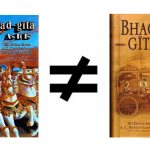
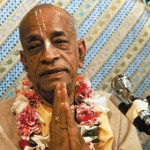
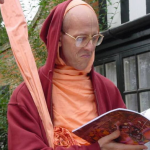

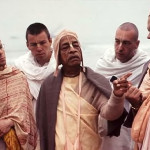

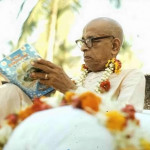
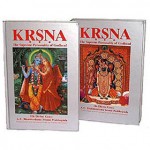
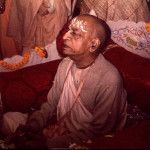
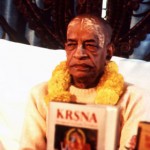
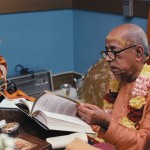
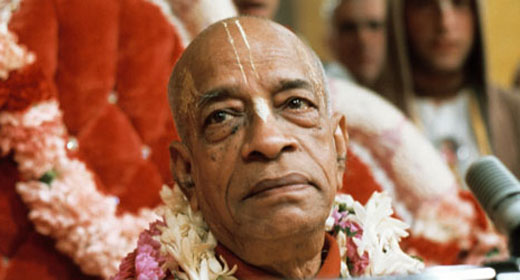
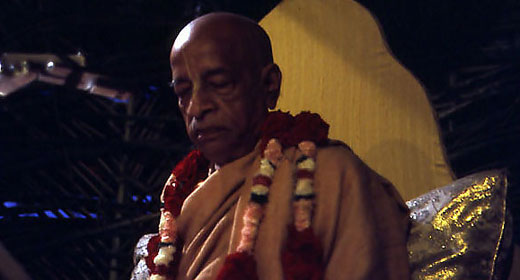
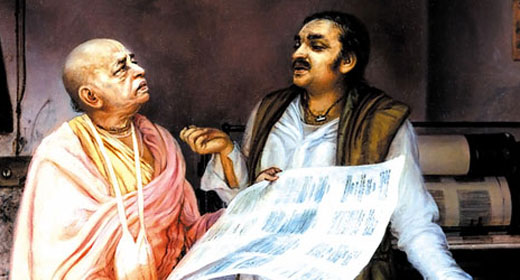
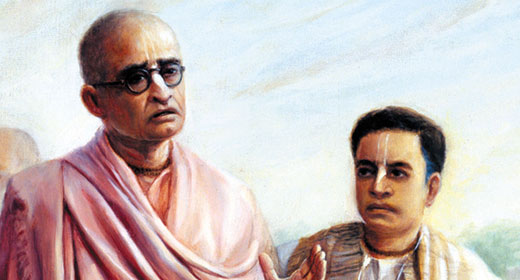
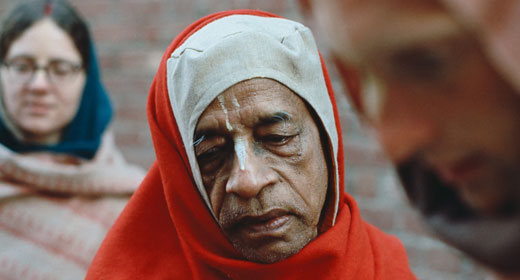
Thank you for compiling all these exchanges between Srila Prabhupada and the senior disciples of His time with us. It is so helpful to have “overheard” these exchanges. I was also especially was moved by the following thoughts: “Transcendental literature that strictly follows the Vedic principles and the conclusion of the Puranas can be written only by a pure devotee. It is not possible for a common man to write books on bhakti, for his writings will not be effective… Since a devotee writes in service to the Lord, the Lord from within gives him so much intelligence that he sits down near the Lord and goes on writing books… The secret in a devotee’s writing is that when he writes about the pastimes of the Lord, the Lord helps him; he does not write alone.” Jai Gurudev
It is one thing to edit a book posthumously, but what seems more
egregious is the editing of a transcript of a conversation. Such
editing is found in the book Journey of Self Discovery, supposedly
by A.C. Bhaktivedanta Swami which was first published in 1990 as we
see from a search of the U.S. Copyright records.
That book includes a conversation between Srila Prabhupada and a
Dr. S. P. Oliver, Rector of the University of Durban,
in Westville, South Africa, on October 10, 1975. The book is
available online through http://www.prabhupadabooks.com and the relevant
page is
http://prabhupadabooks.com/jsd/1/the_science_of_spiritual_life
where we see, during the conversation that Srila Prabhupada asks a
devotee to read some verses and purports from the Bhagavad-Gita As
It Is. There we see that the transcript uses totally text from the
version of the Bhagavad-Gita As It Is that was edited and published
after the departure of Srila Prabhupada. For example, during that
conversation, a devotee supposedly was reading the verse and
purport to BG 4.34. We can see the 1972 version and the later
“Revised and Enlarged” version side by side. http://goo.gl/8HcqrV
It is not possible that a devotee with Srila Prabhupada in 1975 was
able to read the version of the BG that did not exist until the
1980s.
“Your fear that the entire society will be in danger by Raymond’s editing of the Gita is not very suitable remark. Rayarama may not be as qualified as you are, but his one qualification that he is fully surrendered to Krishna
and his Spiritual Master is the first class recommendation for his editing any one of our literatures, because editing of Vedic literatures does not depend on academic education. It is clearly stated in the Upanisads that one who has implicit faith in God as well as in the Spiritual Master, to him only the import of Vedic literature is revealed.”
Letter to Hayagriva, January 15, 1968
Dear Madhudvisa das,
Please accept my humble respects. I greatly appreciate your work in advancing Srila Prabhupada’s real books. I have a question which you may or may not be able to answer. Do you know who edited the posthumously published book “Dialectic Spiritualism A Vedic View of Western Philosophy”? I have done searches trying to find out if this book is readable or not. It does have an introduction by an unmentionable offender (I can’t bring myself to type the name) so I doubt if the book is untainted.
If you do have any information about this, as a newer devotee is interested in philosophy and has read “Beyond Delusion and Doubt” (which I have not seen or read) and appears to possibly be a summary of “Dialectic Spritualism”.
Thank you for your time and your work.
Hare Krishna Mataji
Dialectic Spiritualism was edited by Hayagriva Prabhu who is Prabhupada’s chosen editor. Prabhupada was very anxious that the book be published and he spent hundreds of hours discussing philosophy with Hayagriva and Shyamasundar [I think] Prabhus. So I can not see any reason why this book would not be readable.
Chant Hare Krishna and be happy!
Madhudvisa dasa
Srila Prabhupada Lecture
Srimad Bhagavatam 1.3.15“Advancement means… But we don’t change our Vedic knowledge. We do not say, “Now, Kṛṣṇa, five thousand years ago, said like this. Now we are advanced. We change this line.” Of course, others are doing. In the scriptures… Just like the Christians, they are changing the words. But you cannot do that. Then where is the authority? If you change the word of the scripture, then where is the authority of the scripture? Just like in lawbooks, there is some law made already. Whimsically you cannot, I mean to say, erase the words and put something that “It should be changed like this.” That will not be accepted. Law, if there is change… Actually, there is no change. There cannot be change. Real law means there is no change. Just like day and night, it is coming. The fortnight, the dark period and the light period, it is coming for millions and millions and time immemorial. The same law is going, going on. You cannot change. So as soon as you change, that means it is imperfect. You change.
So Vedic laws are not like that. You cannot change. Five thousand years ago Kṛṣṇa said, sarva-dharmān parityajya mām ekaṁ śaraṇaṁ vraja: [Bg. 18.66] “You give up all other religious principles. Simply surrender unto Me.” We are preaching the same thing. No change. No change. There is no possibility of change. Then how Kṛṣṇa is authority? So change means imperfect knowledge.”
SRILA PRABHUPADA WHILE EXPLAINING THE DIFFERENCE BETWEEN THE ATHEIST AND A THEIST EXPLAINS,
“And one who does not believe in the words of the Vedas, they want to change, they want to misinterpret, interpolate, they are atheists. Bhagavad-gītā, anyone misinterpreting, giving wrong interpretation, or according to his concocted interpre…, they are atheists. Theist, he’ll believe all the words of Bhagavad-gītā as it is, as Arjuna believed, sarvam etad ṛtaṁ manye yad vadasi keśava [Bg. 10.14] = “My dear Kṛṣṇa, whatever You are speaking, without any malinterpretation, without any change of word, I believe in it.” This is theist understanding. Not like the so-called rascal scholars = “It is not like this. It is not like that. I think it is like this.” These are all rascaldom.”
November 4, 1972 Śrīmad-Bhāgavatam 1.2.24 Lecture
Srimad-Bhagavatam 5.6.08
Vrndavana, November 30, 1976 By HDG A C Bhaktivedanta Swami Prabhupada
“What Krsna said five thousand years ago, the same thing Caitanya Mahaprabhu said, same thing. There was no change, as there was no change between the statement of Visvanatha Cakravarti Thakura and Narottama dasa Thakura. Sadhu sastra. As sastra, there is no change. Not that “Modernize. The sastra should be changed.” No. That is nonsense. That is not sastra. Sastra cannot be changed. “Circumstantially, it will be changed, seasonal changes.” No. That is not sastra. Sastra means it is perpetual. What Krsna said five thousand years ago or Krsna said some forty millions of years ago to the sun god… Imam vivasvate yogam proktavan aham avyayam [Bg. 4.1]. He says, “I am talking to you that puratanam yogam.” Not that “Because it has passed millions of years and now it is a different time, so I will have to change.” No. He said, “I am talking to you that very old system.” Is it not? Just see. The sastra cannot be changed. God’s word cannot be changed.He is always perfect. He is always perfect. What He said forty millions of years ago, what He said five thousand years ago, that is also correct up to date. That is sastra. Not that “So many years have passed and it has become old. Now let us reform it and put it into new way.” No.”
Srila Prabhupada comments on his 1972 Bhagavad Gita As It Is Srila Prabhupada…”If you take Bhagavad-gītā as it is, you become self-realized liberated soul. But the misfortune is that we become more than Kṛṣṇa, and we want to comment Bhagavad-gītā in our own way. That is our misfortune. (applause) That is our misfortune” Lectures : Srimad-Bhagavatam 5.5.2 — Hyderabad, April 11, 1975
One day, Ishvara Puripada asked Nimai to correct any errors found in his book. Nimai replied:
Anyone who finds fault with the description of a devotee of Krishna is a sinner. If a devotee writes a poem, no matter how badly he does it, he will undoubtedly contain his love for Krishna. The fool says ‘visnaya’ while a scholar knows the correct form is ‘visnave’, but Krishna accepts the feeling in both cases. If someone sees a flaw in this, the fault is his, because Krishna is satisfied with whatever the pure devotee says. You also describe the Lord with words of love, so who is the arrogant person would dare to criticize what you have written? (Chaitanya Bhagavata 1.11.105-